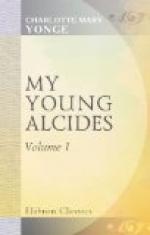When our greeting was over, Harold turned and said, “Here he is.”
I saw a fine-looking old man, with a certain majesty of air that one could not define. He was pale, wrinkled, and had deep furrows of suffering on cheek and brow, but his dark eyes, under a shaggy white penthouse, were full of keen fire and even ardour. His bald forehead was very fine, and his mouth—fully visible, for he was closely shaven—had an ineffable, melancholy sweetness about it, so that the wonderful power of leading all with whom he came in contact was no longer a mystery to me; for, fierce patriot and desperate republican as he might have been, nothing could destroy the inborn noble, and instinctively I bent to him with respect as I took his hand in welcome.
After the hasty inquiries, “Where’s Dora?” “Where’s Eustace?” “Where’s Dermot Tracy?” had been answered, and I had learnt that this last had gone on to London, where his family were, Harold hurried out to see about sending for the luggage, and Prometesky, turning to me, almost took my breath away by saying, “Madam, I revere you. You have done for the youth so dear to me what I could never have done, and have transformed him from a noble savage to that far higher being— the Christian hero.”
I did not take this magnificent compliment as if I had been of the courtly continental blood of him who made it: it made me hot and sheepish, yet even now I still feel warm at the heart when I remember it; for I know he really meant it, little as I deserved it, for the truth was what I faltered out: “It was all in him.”
“It was all in him. That is true; but it needed to be evoked, so as not to be any longer stifled and perverted by the vehemence of his physical nature. When he left me, after the great catastrophe which changed him from the mere exaggerated child, gratifying every passion with violence, I knew it depended on what hands he would fall into, whether the spiritual or the animal would have the mastery. Madam, it was into your hands that he fell, and I thank God for it, even more than for the deliverance that my dear pupil has gained for me.”
He had tears in his eyes as he took my hand and kissed it, and very much overpowered I was. I had somewhat dreaded finding him a free-thinker, but there was something in both speeches that consoled me, and he afterwards said to me: “Madam, in our youth intellectual Catholics are apt to reject what our reason will not accept. We love not authority. In age we gain sympathy with authority, and experience has taught us that there can be a Wisdom surpassing our own. We have proved for ourselves that love cannot live without faith.”
And Harold told me on the evening of their return, with much concern, that the old man had made up his mind that, so soon as his health should be sufficiently restored, he would make retreat among the monks of La Trappe experimentally, and should probably take the vows. “I don’t see that his pardon has done much good,” he said, and did not greatly accept my representation of the marvellous difference it must make to a Roman Catholic to be no longer isolated from the offices of religion. He had made up his mind to come into Sydney to die, but he was too poor to have lived anywhere but under the Boola Boola rock.




